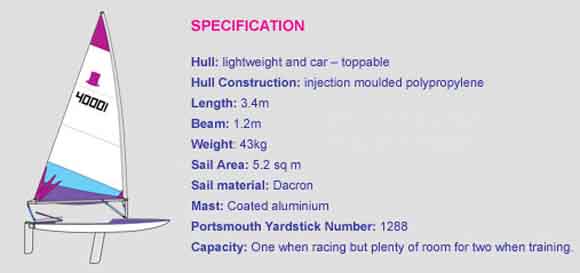Displaying items by tag: International Topper Class Association of Ireland
International Topper Class Association of Ireland
The Irish Topper Class Association promotes the Topper Class in Ireland, both North and South, through the organising of competition and through the provision of coaching and support to topper sailors. Click here for all the latest Topper Sailing News.
The class has grown and currently has in excess of 100 sailors registered from all parts of the country.
Throughout the year, we promote a number of events that cater for all ability levels, from young sailors just starting out, to those with considerable race experience who aspire to race at international level.
Racing consists of: a Topper Traveller Championship, made up of five events at different clubs throughout the year; Provincial championship events held throughout Ireland (usually Ulster, Munster, and Leinster), and the Irish National Championships – usually attracts the cream of the GBR squad to do battle with!
2008 was an important year for the class with the very successful staging of the World Championship at Fenit – Tralee Bay Sailing Club from the 19th–25th July.
Whatever level you sail, you are sure of a warm welcome to one of the most social of sports there are!
International Topper Class Association Ireland
Whether just messing about in boats, having fun off a beach, learning to sail, flat out blasting or competitive racing, there are so many reasons for choosing the fantastic Topper! It requires little maintenance, is easily rigged in a matter of minutes, is rugged and safe for beginners and an exciting race boat too as your skills develop and it is car-toppable! It truly is the most versatile of sailboats!

The Topper was designed by Ian Proctor whose other boats include the ever popular Wayfarer. It was originally constructed in GRP but this was changed quite early on to an injection moulding construction. After well over 20 years of continuous production (approaching 50,000 boats!) it is the outstanding build quality, durability and innovative design features that have made the Topper a very popular boat. The Topper hull is injection moulded with incredible precision, reaching a level of uniformity quite outside the scope of any other production system, either hand built or mass produced in GRP or roto-moulded plastic. The material is polypropylene which has proved to combine strength and flexibility with lightness and virtually everlasting life. Because of this proven reputation resale values are extremely high.
In 1977 the Topper was awarded the Design Council Award and the Horner Award for achievements in plastics. The Topper is used in the Open University television programme to illustrate the principles of craft, design and technology, the development of injection moulding techniques and the handling and use of plastics in industry.
The two main mouldings of the Topper hull are fuse welded together to produce a robust single unit. Specially shaped polystyrene blocks are fitted at this stage to provide extra stiffness and enormous reserves of positive buoyancy in the very unlikely event of the Topper’s tough skin being holed. The hull of every Topper has a five year warranty proving that the builders have great confidence in it.
Clever design features include a clever swivelling mast gate that enables you to erect the mast single-handed. There is a brilliant rudder system that allows the blade to be set and locked in any position at the flick of a wrist. And the hull plate can survive the boat coming ashore at high speed with the dagger-board still down! The aluminium mast is un stayed and in two sections allowing the spars to be stored within the length of the boat. The sail has a luff tube which makes rigging really easy. The daggerboard is made like a rudder blade of a moulded polypropylene which never snaps. But it can sink, so you must tie it on!
John Driscoll an RYA National Sailing Coach wrote "The Topper dinghy has a unique place in the world of sailing instruction." He went on to say " It is hard to find a sailing school or holiday centre without a fleet of Toppers and here’s why: Topper’s cutting edge comes from her robustness, her simplicity, versatility and her ease of handling ashore and afloat. She’ll take all the knocks of a sailing day and bounce back smiling. Just like the students. She’s taken the fear factor out of the capsize drill. She’s made it easy to learn and fun to be with"
TOPPER – THE IDEAL CIRCUIT RACER
Because of the builder’s commitment to uniformity of hulls and specification of fittings and equipment, a Topper can race with any other Topper, older or younger, on equal terms. A true One Design. With full International recognition from the International Sailing Federation (ISAF), the Topper phenomenon is spreading around the World.
DEVELOPMENTS
Recently the Class has adopted the option of a centre main-sheeting system with a longer tiller extension as an alternative to the established aft sheeting. This has made the boat more comfortable to sail for some sailors, whilst others are staying resolutely with their original aft sheeting arrangement – confirmation that the rigorous testing process carried out to ensure that no competitive advantage would be gained was worthwhile. In future we have in development a ‘cut down’ sail which should enable smaller sailors to enjoy the thrill of sailing Toppers without having to reef the full sized sail.
THE FRIENDLY CLASS
This reputation is well earned both by the sailors themselves and their shore-side parents and supporters.
International Topper Class Association (ITCA), ITCA Secretary: Helen Evans, 4 Dig Lane, Wynbunbury, Nantwich, Cheshire CW5 7EZ, England Tel/Fax: +44 (0)1270 567047, mail: [email protected]
There is a space for Irish boating clubs and racing classes to use as their own bulletin board and forum for announcements and discussion. If you want to see a dedicated forum slot for your club or class, click here























































